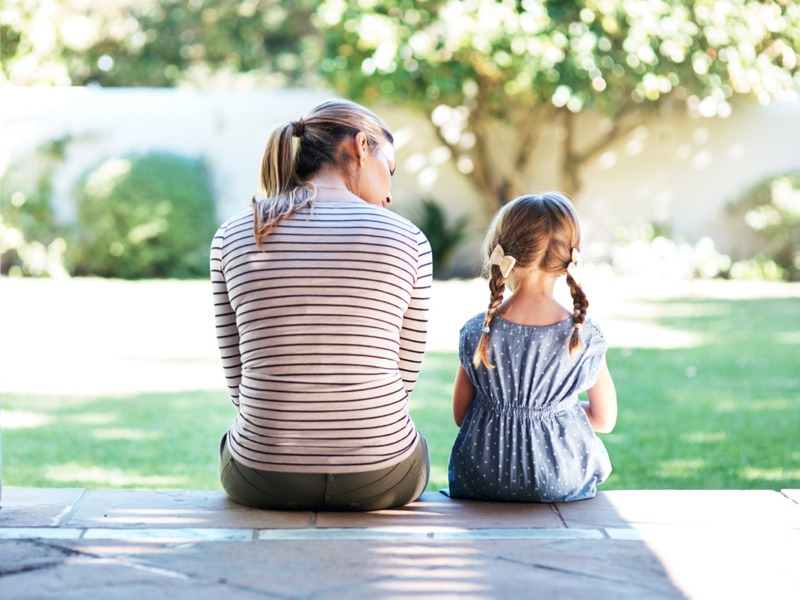This article was written in consultation with Beyond Blue. Medibank and Beyond Blue are working together to empower all people in Australia to be better connected with knowledge, resources and support to improve their mental health and wellbeing.
Anxiety in teenagers
Anxiety is a normal reaction to stressful situations, and we all feel anxious sometimes – it might be about exam results, a job interview or talking in front of a group of people.
Our palms start sweating, our heart races and we might feel a bit sick. This kind of anxiety is a hard-wired part of our survival instinct and helps to tell us if there’s something significant happening. It might be a dangerous situation we need to avoid, or a task we need to get done quickly – so a bit of anxiety can be useful sometimes.
But for some young people, these intense feelings or fears can become overwhelming and can happen for no apparent reason. They find that their anxiety is unbearable and that just getting through the day is hard work. Anything extra becomes further cause for anxiety. Anxiety conditions can be crippling to a young person’s life if they don’t get the support they need.
What a young person might feel
It probably seems obvious, but young people experiencing anxiety feel ‘on edge’ or worried most of the time. Feeling overwhelmed, frightened (particularly when having to face certain objects, situations or events), dread (that something bad is going to happen) or panicked are also common. Their anxiety might increase when they’re asked to do something out of the ordinary.
Some young people also experience a range of physical symptoms when they’re anxious – heart racing, butterflies in the stomach, muscle tension, shaking hands or nausea. These physical symptoms might even make them worry that they have an undiagnosed medical problem, which can make their anxiety worse.
“My heart was beating so fast and so loud I honestly thought it was going to fail at any moment. This continued for days.”



What a young person might think
Young people with an anxiety condition often describe an inability to stop thinking, and that their thoughts are often unwanted and intrusive. They can find it hard to focus on anything other than their worries. Some identify that what they’re thinking about may be irrational or silly, but that they are unable to stop these intense and sometimes unbearable thoughts. These thoughts may also be negative, which in turn can make them feel more miserable and anxious.
Some young people also experience upsetting dreams or flashbacks of a traumatic event.
Some common anxious thoughts include:
- “I’m going crazy.”
- “I can’t control myself.”
- “I’m about to die.”
- “People are judging me.”
What a young person might do
Our natural instinct is to avoid situations that cause anxiety or stress. So when a young person develops an anxiety condition, they may begin to avoid places, people or specific situations that cause them to worry. This might mean that they start to withdraw from friends and community, as social situations may be overwhelming. They might begin to dread or avoid going to school, university or work because of how they feel.
Other young people may experience urges to perform certain rituals in an attempt to relieve anxiety, find decision-making stressful, be easily startled, and have difficulty being assertive. Many young people who experience anxiety also find it hard to sleep and consequently feel really tired. A lack of sleep can also cause their symptoms to worsen, as they have had no rest or opportunity to have a break from their thoughts.
“I experienced uncontrollable strings of panic attacks, followed by days where I was simply unable to get out of bed or eat. It wasn't until I ran out of a university lecture in the midst of an intense panic attack that I decided to seek proper help.”
Anxiety is a part of life but it should not create an ongoing sense of fear or dread, or dramatically change the way someone spends their time. If a young person you know is experiencing extended periods of anxiety, and it’s changing the way they do things, then they might be experiencing an anxiety condition.
What are the different types of anxiety?
There are six types of anxiety, each with slightly different signs and symptoms.
Generalised anxiety disorder (GAD)
A person feels anxious most days and worries about everyday situations such as school, work, relationships or health for a period of six months or more.
Obsessive compulsive disorder (OCD)
A person experiences unwanted and intrusive thoughts and fears (obsessions) that leave them feeling really anxious. To manage these anxious thoughts they begin to do things, or use rituals (compulsions) to cope. Even though they often know that these thoughts are irrational, the obsessions return all the time and the compulsions are hard to resist. For example, a fear of germs can lead to constant washing of hands and clothes.
Panic disorder
A person has regular panic attacks for more than a month. The panic attacks are periods of intense fear or extreme anxiety that happen suddenly or when there is no sign of danger. Physical symptoms, like sweating, feeling short of breath, pounding heart, dry mouth, thinking that you’re dying, and losing control or about to collapse are common in panic attacks.
Post-traumatic stress disorder (PTSD)
PTSD can happen after experiencing a traumatic event, for example, war, assault, an accident or disaster. A person may experience difficulty relaxing, upsetting dreams or flashbacks, and avoidance of anything that reminds them of the event.
Social phobia
A person has an intense fear of being criticised, embarrassed or humiliated, even in everyday situations, such as speaking publicly, eating in public, being assertive at work or making small talk.
Specific phobias
A person feels anxious about a particular object or situation, like going near an animal, going to a social event, or receiving an injection and will go to great lengths to avoid it. Some phobias include animals, insects, heights, and blood.
Many people experience more than one type of anxiety and may experience depression as well.
Common symptoms of anxiety
Feelings
- overwhelmed
- fear (particularly when having to face certain objects, situations or events)
- worried about physical symptoms (e.g. fearing an undiagnosed medical problem)
- dread (e.g. that something bad is going to happen)
- constantly tense, nervous or on edge
- uncontrollable or overwhelming panic
Physical
- increased heart rate/racing heart
- shortness of breath
- vomiting, nausea or pain in the stomach
- muscle tension and pain (e.g. sore back or jaw)
- feeling detached from your physical self or surroundings
- having trouble sleeping (e.g. difficulty falling or staying asleep or restless sleep)
- sweating, shaking
- dizzy, lightheaded or faint
- numbness or tingling
- hot or cold flushes
- difficulty concentrating
Thoughts
- “I’m going crazy.”
- “I can’t control myself.”
- “I’m about to die.”
- “People are judging me.”
- having upsetting dreams or flashbacks of a traumatic event
- finding it hard to stop worrying
- unwanted or intrusive thoughts
Behaviour
- withdrawing from or avoiding objects or situations which cause anxiety
- urges to perform certain rituals to relieve anxiety
- difficulty making decisions
- being startled easily
- not being assertive (i.e. avoiding eye contact)
Beyond Blue
Learn more about anxiety, depression, suicide prevention and ways to support your mental health.

Where to get help
The best place to start is by speaking to your GP or health practitioner. They will be able to assess your individual situation and recommend the best next steps for your recovery.
A team of mental health professionals are here to support you with 24/7 Medibank Mental Health Support. It’s available to Medibank health insurance members at no extra cost~ 24 hours a day, 7 days a week. Call 1800 644 325 or log in using My Medibank.
If at any point you feel like someone’s life is in danger, seek immediate help. Contact Lifeline on 13 11 14 for crisis support and call 000 if you believe that someone’s life is in danger.
For more support and information
Further reading

How to support your anxious child
Some kids find it much harder to manage stressful situations and the world can be scarier for them than for other kids their age. Here's a glimpse at how your can support an anxious child.

Supporting mental health through early childhood
Promoting good mental health is key to your child’s development through their primary school years. Here’s how can you make sure they’re getting what they need and how to spot the signs that they might be struggling.

Seeking help: the basics
If you need help because you or a loved one are experiencing a mental health condition, here are the basics.

Depression in children
Depression can stop kids enjoying the things they normally like doing, or taking part in their usual activities. Find out about the signs of depression in children and what you can do to help.
Explore more from Better Minds

Things you need to know
~ Some referred services may involve out of pocket costs and waiting periods may apply.
While we hope you find this information helpful, please note that it is general in nature. It is not health advice, and is not tailored to meet your individual health needs. You should always consult a trusted health professional before making decisions about your health care. While we have prepared the information carefully, we can’t guarantee that it is accurate, complete or up-to-date. And while we may mention goods or services provided by others, we aren’t specifically endorsing them and can’t accept responsibility for them. For these reasons we are unable to accept responsibility for any loss that may be sustained from acting on this information (subject to applicable consumer guarantees).